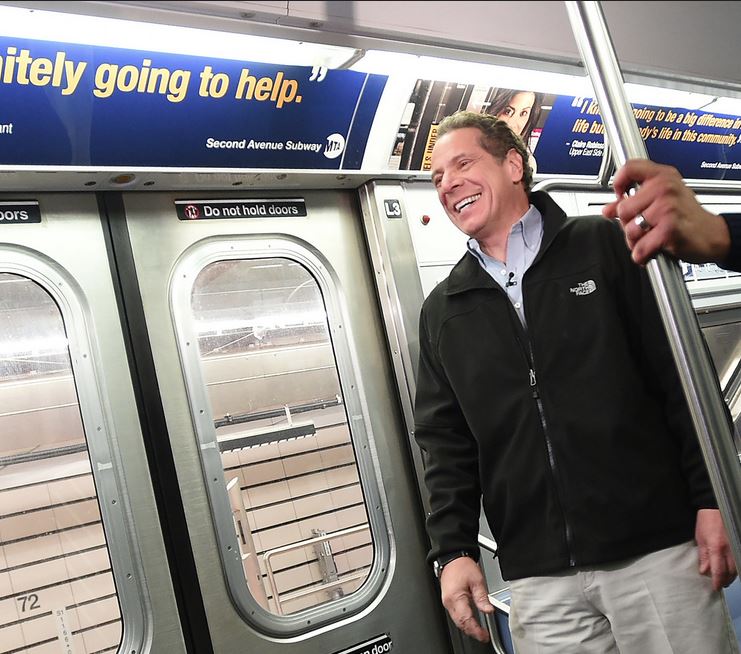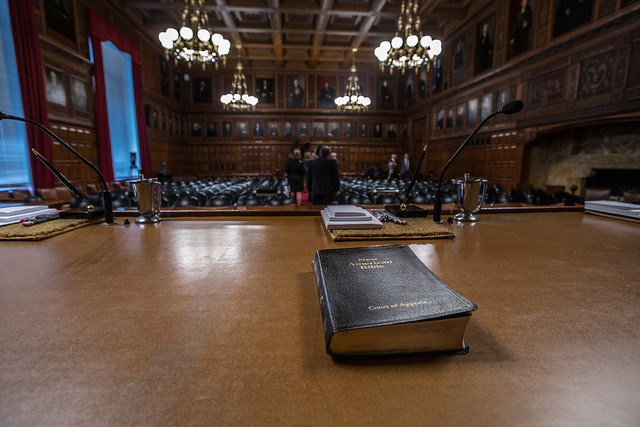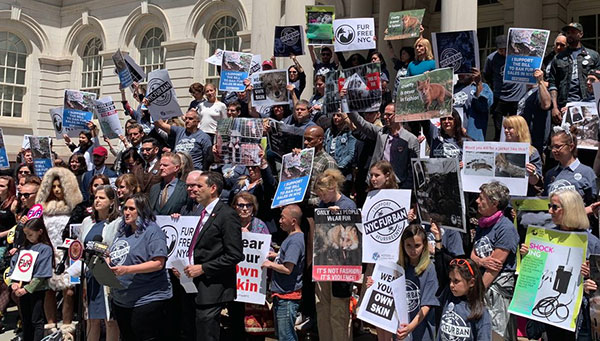Governor Gets What He Wants at the MTA; Now It's Time to Deliver

Gov. Cuomo on the subway (photo: the governor's office)
At the end of the state legislative session that just finished several steps were taken to consolidate Governor Cuomo’s power over the MTA. First, he swapped out two of his ‘independent’ appointees to the MTA Board for two members of his state cabinet, Robert Mujica, his budget director, and Linda Lacewell, commissioner of the Department of Financial Services.
Second, in order to legitimize the board appointment of someone who is not a resident of the MTA region, the law was changed to provide that the state budget director, regardless of residence, may serve on the board ex-officio.
Finally, a new law was passed requiring the appointment within six weeks of a “transformation director” to report directly to the MTA Board to implement the reorganization plan that was required by the budget bills passed in early April and is expected to be prepared and submitted by June 30.
These actions have been criticized by respected transit analysts, (see here and here), largely on the grounds that the governor is creating conflicts of interest by placing his own full-time employees on a board that is supposed to be independent and that he is undermining the governance of the MTA by creating new positions outside the existing chain of command.
These are valid concerns; however, for those who have bemoaned Governor Cuomo’s past ambivalence about his responsibility for the transit system, the actions have a significant upside: they establish clearly and beyond any doubt that the Governor of the State is the ultimate authority and decision-maker with regard to the MTA. And this governor has now taken ownership of it in a clear and unequivocal way.
I know Rob Mujica; he is one of the most competent people I have worked with in government. I have no reason to think that Linda Lacewell is any less capable.
They both bring a great deal of management experience and knowledge of public finance to their new roles as MTA board members. Yes, they will have to navigate their loyalty to Governor Cuomo and their fiduciary duty to the MTA; there may be issues on which one or both of them will need to recuse themselves. But for the most part, their other roles should complement and enhance their value as board members.
In fact, it may be a good idea to designate the state budget director as an ex-officio member of the MTA Board – and the city budget director as well, for that matter. Both governments have significant control over resources that are and/or should be devoted to the MTA, particularly with regard to its capital spending.
On the other hand, it is certainly unusual and probably not optimal to specify that a particular staff line at the MTA, i.e. a new Transformation Director, report directly to the Board and not to the CEO.
Consolidation of services has long been a favorite topic of Governor Cuomo and it makes sense that redundant departments among MTA divisions (NYCT, LIRR, MetroNorth, and TBTA) be combined. But reorganization of those agencies will not fundamentally change the MTA’s financial picture; more concerning than the new hire is raising unrealistic expectations about what “transformation” will accomplish.
In any event, Governor Cuomo, with the assistance of the state Legislature, has solidified his control, and it is long past time for him to move on from bashing the organization to creating and supporting useful change. He should take responsibility for:
1. Release of a new 20-year needs assessment that shows the full cost of getting every single piece of MTA infrastructure to a state of good repair. The last assessment was issued in 2013 and another is required by law in 2020. We cannot pay for everything at once, and there may be some items on the wish list we can never pursue, but we must see what all the needs are so that the public can provide input and the MTA Board can decide what needs to be prioritized.
2. Release of a five-year capital plan. The current plan covers 2014-19 and another is expected by October, for 2020-2024. Estimates of the cost of a complete plan for the MTA’s next five years range from $40-60 billion. Let’s see what the authority has decided to prioritize and how it is going to be paid for. Of course, money should not be wasted; but don’t skimp on this, the most important infrastructure in the state. In the past, the governor and his representatives have pressured the MTA to reduce its “bloated” capital plan, only to later agree to increases because of the urgency of the needs. Will Mujica and Lacewell support the full amount the MTA needs or try to protect the Governor from having to come up with more revenue by arguing for less?
3. Making it clear that the commitment to contribute $8 billion in state dollars to the current five-year capital plan will be honored, and specify what projects it will fund. All the projects in the current plan have not been completed; large projects are almost never fully achieved within a single five-year capital plan because construction commitments take time. But this money should not be allowed to disappear or be rolled over to fund the next five-year plan.
4. Focusing most of the money, time, and attention on getting the current transit system to operate effectively and safely, not on shiny new projects that lend themselves to ribbon cuttings but don’t improve travel times and experiences for most commuters.
5. Negotiating tough new contracts with the TWU and other unions that do not add any costs for the MTA and its riders. Curbing overtime abuse is of course important (another hands-on tactic of the governor was to hand-pick a new MTA Inspector General) but it is labor costs that are the primary driver of MTA spending, accounting for 60% of the MTA’s annual operating budget. The next round of contracts MUST contain work-rule changes that make workers more productive and contribute to cost savings, not increases. (Bob Linn is an excellent new appointment to the MTA Board who should be able to assist in this effort.)
OK, Governor Cuomo, you have been given everything you wanted in terms of control, more than many think is appropriate. Use your power wisely and effectively because there is no longer any question the subway buck stops with you.
***
Carol Kellermann was president of Citizens Budget Commission from 2008 through 2018.
***
Have an op-ed idea or submission for Gotham Gazette? Email This email address is being protected from spambots. You need JavaScript enabled to view it.
Public Defenders as Prosecutors: Unanswered Questions

(photo: the governor's office)
The recognition that prosecutors were a primary cause of mass incarceration has spawned a movement for progressive prosecutors. While exactly what it means to be a progressive prosecutor is far from clear, at a minimum it reflects a change in the way prosecutors approached their work over the past several decades.
Common features of a progressive prosecutor include emphasizing diversion over prosecution for minor crimes; declining to prosecute marijuana arrests in certain circumstances; and reducing or eliminating calls for money bail. While to many these adjustments seem more like correctives than anything particularly progressive, they do signal important changes to the prosecutorial status quo.
As surprising as it is to witness the number of District Attorney candidates running as criminal justice reformers, it is even more remarkable that many of these candidates are current or former Public Defenders campaigning to be the prosecutor in the very court in which they have been defending their clients. To devotees of the progressive prosecutor movement, this development is like manna from heaven; every Public Defender is seen as uniquely qualified by virtue of having been a Public Defender.
In the years since the Supreme Court ruled that anyone facing incarceration is entitled to an attorney, there have been countless reports about the crisis in indigent defense and the effectiveness of government appointed lawyers. Often, the crisis centers around resources; Public Defenders have too many clients and too little funding. Yet there is also the reality that not all Public Defenders are vigorous, dedicated and indefatigably zealous advocates for their clients.
Before anointing any Public Defenders as righteous District Attorneys, it is imperative to discern what kind of Public Defender they were. Did they pound the pavement looking for witnesses? Did they spend hours researching the law and writing novel arguments to expand the law and protect their clients’ rights? Did they visit their clients whether in jail, prison, or at home? Did they regularly push back against prosecutors and fight in court with judges who ran roughshod over their clients?
The paradox is that most, if not all, of the fierce and tireless Public Defenders who meet the “test” spelled out above are the very ones who likely could not imagine prosecuting their clients in any way shape or form. And after all the cases are diverted from court, and all the low-level offenses are dismissed, that is what Public Defenders turned District Attorneys will do -- prosecute their former clients. That prosecution will be kinder, gentler, and more attuned to race and poverty, but thousands and thousands of people will still be prosecuted, and many of them will end up enduring the brutality, despair, and violence of years lived in prison cells.
The progressive prosecutor won’t ask for money bail very often, or maybe not at all, but will ask that any number of people be held without bail or subject to all kinds of surveillance and restraints on their liberty.
The progressive prosecutor won’t seek incarceration except as necessary, or even only as a last resort, but will find that last resort with respect to thousands of people.
The progressive prosecutor won’t ask for the maximum sentence all the time, and maybe only in some cases, but will still often ask for jail or prison sentences.
These truths make most committed Public Defenders shudder at the thought of being the elected prosecutor and having people incarcerated, even for a day, in their name.
Public Defenders daily witness all manner of damage, indignity and violence inflicted on clients, their families, and their communities. They argue every day that the criminal legal system is unjust from biased and unconstitutional stops, arrests, interrogations. and line-ups, to rubber stamp Grand Juries, and through plea bargaining and trial processes that promote efficiency and punishment over fairness and decency.
They are called to stand, literally and figuratively, between the awesome power of the government and their clients. Public Defenders as prosecutors will now face their former clients, level accusations against them, and frequently argue against the assertion, let alone expansion, of their constitutional rights. Suddenly, warrants are not always required, the Grand Jury isn’t so bad, and police interrogations are a valuable societal tool.
When I was a fledgling Public Defender, I was assigned to assist a supervisor representing a man charged with a particularly brutal crime. Several lawyers from the assigned counsel panel had already declined to take the case, the prosecutor was seeking a maximum sentence, the judge didn’t even try to hide his contempt for our client, and the media coverage was dehumanizing.
In his audiotaped confession, our client recounted in graphic detail what he did and why he did it. I asked my supervisor how he felt about representing this client. He responded by saying that it was exactly clients like this, who just about everyone wants to throw away, that most desperately needed a committed Public Defender.
Ironically, this is the very man the progressive prosecutor will prosecute, albeit with greater awareness and sensitivity. His case will not be dismissed or diverted out of court. He will not be released without bail. And the progressive prosecutor will seek a prison sentence.
Accepting for now the current system, the question is not so much whether that man should be prosecuted but who should, or could, do the prosecuting. A consummate Public Defender couldn’t be the person standing in court saying that this person, this man standing five feet from me, must, in my name and my role as prosecutor, go to state prison. Maybe the Public Defender who could do that made the right move in becoming a prosecutor. Maybe they didn’t have the right stuff to be a Public Defender in the first place.
***
Steven Zeidman is a professor of law at CUNY School of Law. On Twitter @SteveZeidman.
***
Have an op-ed idea or submission for Gotham Gazette? Email This email address is being protected from spambots. You need JavaScript enabled to view it.
Banning Fur is Not an Issue of Race

(photo: @theanimalvoters)
The world around us is changing. People are making more ethical choices concerning the environment and the welfare of other species. We’re starting to use less plastic because of the impact it has on our oceans and ocean life. More and more people are choosing vegan milks and meats as they come to understand the ill effects that factory farming has on the planet.
A ban on fur in New York City would be a step in the same ethical direction.
New York has long been considered a fashion Mecca. We have always set the pace for others to follow, but on the issue of fur, we’re falling behind while everyone else is moving ahead.
Fur farms all over the world are already closing. Cities like Los Angeles, San Francisco, and West Hollywood have already banned sales of new fur items. Famous designers including Prada, Versace, Michael Kors, Armani, Gucci, and so many others are saying “no” to fur. New York is behind the curve. In 2019, wearing the skin of other sentient beings is simply unacceptable.
Two years ago, my daughter asked me for a Canada Goose coat. I told her, “Taj, you know I’d do anything for you, but you’re not getting that coat. You have a choice. Animals don’t.” I explained to her how coyotes are caught in steel traps and left in pain, struggling and crying, until a trapper finally arrives to shoot them or beat them to death—just so their fur can be used for the trim on a jacket hood. After I explained this to her, she didn’t want the coat anymore, and she asked me, “Daddy, why don’t they just use fake fur?”
That’s a question I want everyone reading this to think about. Why are we not using faux fur, especially when sustainable, vegan materials, such as faux fur made from hemp or recycled plastic bottles, are kinder to animals and the environment? Why are we putting profit over ethics?
Animals are not “things” to be used for our own ends any more than people of color are “things” to be used by whites.
I say this as a descendant of African slaves, who were brought to this country and used as a commodity. It disturbs me greatly to see other fellow sentient beings have their freedom and lives taken from them and be used as commodities for human gain.
Why would a people with a history of violated human rights approve of the unfair treatment of others? We should be speaking up for the most vulnerable among us.
To those in the African-American community who say that a fur ban is “racist” and a form of discrimination, please remember that you are not the victim. The victims are the millions of animals killed every year for what is rightfully theirs—their very skin and fur.
And to those in the African-American community who believe that a fur ban is an attack on our culture, you’re disregarding our own history of oppression. If you speak of freedom, but it’s only in regard to others who happen to look like you, is it really freedom? Shouldn’t we want freedom for all sentient life?
Banning fur is not an issue of race. It is an issue of rights. As humans, our morals can be judged by how we treat those who are the most vulnerable. That’s why I encourage everyone in the city to stand on the right side of justice and support the proposed fur ban. Oppression is oppression regardless of who it is happening to, and when we have the opportunity to end one form of injustice, we must seize it.
***
Stewart Mitchell is a leader in the animal rights movement in Brooklyn, author, and father.
***
Have an op-ed idea or submission for Gotham Gazette? Email This email address is being protected from spambots. You need JavaScript enabled to view it.




